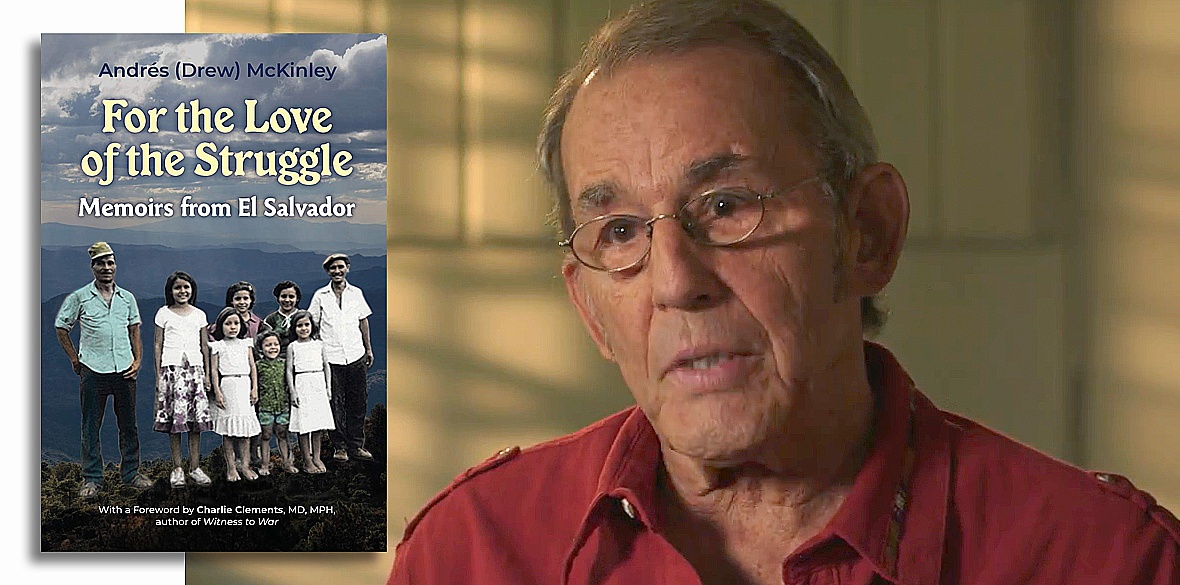This is the last article you can read this month
You can read more article this month
You can read more articles this month
Sorry your limit is up for this month
Reset on:
Please help support the Morning Star by subscribing here
For the Love of the Struggle: Memoirs from El Salvador
by Andres McKinley
(Daraja Press, £16.99)
NORMALLY, I’d be wary of a book written by a North American who cut his teeth as a US Peace Corps volunteer in Africa which is purportedly about the struggles of people in a poor country.
But this book disabused me of that prejudice.
Its author Andres McKinley spent several decades living and working in El Salvador among the peasants and the guerillas and his experience gave rise to this incredibly moving and well-written narrative of the daily heroism of El Salvador’s people in the face of insurmountable odds.
It is a pity, though, that he begins with an unnecessarily indulgent chapter about his family background and forefathers which is hardy relevant to his report on El Salvador.
El Salvador, the tiniest country in Central America and hardly the size of Wales, has a population of six million and from the 1970s onwards experienced one of the most brutal proxy wars of the 20th century, financed and orchestrated by the US.
Anyone in the country asking for better wages or working conditions, demanding an education or campaigning for social justice was deemed a “communist terrorist” and treated accordingly.
El Salvador (“The Redeemer”) is an ironic name for a country that has been coerced into undergoing its own Calvary.
The war, so clearly aimed at keeping this impoverished and oppressed nation in that state for ever, turned McKinley into a supporter of the Salvadoran struggle and opened his eyes to the horrors of US imperialism.
His book is not an autobiography but, dedicated to the resilient Salvadorian people, a selective memoir of his time there.
Of Catholic background but becoming a Quaker, the author was clearly motivated by his conscience to help the poor and oppressed of this world.
A disciple of liberation theology, he eventually joined the guerillas in a move that he himself described as motivated by idealism, naivety and a desire for martyrdom.
He provides a concise and graphic picture of life in El Salvador, where 60 per cent of the land is owned by 2 per cent of the population and severe malnutrition, poverty and illiteracy have always been the lot of the majority.
In excruciating detail, he relates how for over a decade the Salvadoran armed forces, with full US backing, rampaged through the country, killing, raping and torturing.
All peasants and students, radical priests and charity workers, seen as the potential enemy, were to be eradicated.
Between 1981 and 1992 the United States, under successive presidents, poured billions of dollars into this tiny nation, in the form of arms and military support for a corrupt oligarchy.
It was all in the name of defeating communism but in fact led to the massacre of over 250,000 people, mainly poor and illiterate peasants, and drove many more thousands of survivors into exile.
“The historical causes of the struggle were ignored,” McKinley writes, “while insanity crept into an already faulty US foreign policy in El Salvador and would go on to fuel 12 years of bloody civil war.”
That war ended in 1992 and people felt a new era was about to dawn, with former guerillas entering government. But with US- and IMF-imposed neoliberal policies and the trauma left over from the war, that dawn never came.
Half a century of military dictatorship and years of war, followed by almost three decades of neoliberal policies have left over 50 per cent of the population still in dire poverty, with 40 per cent unemployment, thousands dying each year of curable diseases and astronomical rates of violent crime that have turned the country into one of the most dangerous places in the Western hemisphere.
McKinley, unlike hundreds of thousands of Salvadorans who have been forced to trek the dangerous route north to the US in search of “paradise,” decided to go the other way and still lives in El Salvador, working as an adviser on public policy.
He’s produced a brave, engagingly written and informative book.











